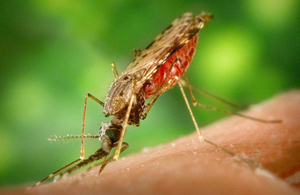Innovation: MHRA supports innovative vaccine development at the University of Oxford
Innovative approach to developing vaccines for some of the world’s most virulent diseases.

The issue
Researchers at the Jenner Institute, University of Oxford have been developing and manufacturing a vaccine for treatment of malaria that has seen them explore an innovative approach to researching viral vectors using a chimpanzee virus. Malaria is a disease that is found in over 100 countries and led to the deaths of 627,000 people in 2012 (World Malaria Report, World Health Organization (WHO), 2013).
Their chosen strategy was to bio-engineer a viral vector - a heavily modified version of a common virus that can infect cells but can no longer replicate or cause disease. This viral vector is used as a ‘carrier’ to deliver genetic material from the agent causing the disease to be treated, for example malaria. The products from the delivered genes are recognised as ‘foreign’ by the patient’s bodily immune system and an immune response is generated. Candidate vaccines (viral vectors) that are developed are then tested in human volunteers in very specific and controlled situations, so as to mitigate any risk and to protect volunteers’ safety. This is to test if the vaccine is safe and to check if the human host’s natural immune system detects the “foreign” gene products expressed from the viral vector and develops antibodies or cellular immune responses against them.
Often viral vectors are based on a virus that infects humans; however, there is likelihood that the volunteers (humans) have already been exposed to the virus, in some form or other, and therefore possess some level of background immunity. This means that the reaction to the vaccine produced using that viral vector is often reduced and the vaccine may be less effective than desired. Researchers have therefore sought a brand new vector/carrier that the general public’s immune system would not have been exposed to before.
The researchers hypothesised that if they modified the common cold chimpanzee virus in the development of the viral vector, the human immune system would have to develop an immune response from scratch; the likelihood of having any previous exposure to the same virus would be extremely low. In taking this innovative approach forward, the research team faced a set of new questions and challenges including - what would the regulatory authorities consider as an appropriate testing package to ensure the safety of volunteers who would be subjected to a viral vector made from a chimpanzee virus and how would they consider use of such a product in clinical trials?
How MHRA helped
The University of Oxford and its Clinical BioManufacturing Facility approached MHRA and initiated an early dialogue in order to receive feedback, guidance and support in the development and manufacture of their clinical research project.
Eleanor Berrie, QP, Clinical BioManufacturing Facility, University of Oxford, said:
“We needed to work quickly to find the answers to questions that would help us develop an effective programme of research to develop a novel replication-incompetent non-human primate viral vector for clinical use. The experts at the MHRA were quick to recognise our innovative approach and worked with us closely at a number of vital milestones, which in turn helped us bring this breakthrough to the fore: a new way to develop vaccines for some of the world’s most virulent diseases.”
The University of Oxford said the MHRA helped by:
- connecting the researchers to the relevant MHRA teams at the right time, depending on their queries, including:
- clinical trials teams
- good manufacturing practice inspectorate
- pharmaceutical assessors
- toxicologists
- initiating discussions and meetings with academic groups and their representatives
- reviewing information package and risk assessments
- providing invaluable feedback that helped the researchers progress their project
The outcome
The outcomes of this work could have a huge impact on public health. Using this approach, researchers at the University of Oxford have developed a panel of novel vaccines for early phase studies in the treatment of malaria and other diseases including HIV, TB, flu and most recently in Oxford-based studies of the clinical use of a vaccine for Ebola virus disease (EVD).
Dr Siu Ping Lam, Director of Licensing, MHRA, said:
“Viruses evolve and new vaccines need to be found to stop or inhibit their spread. It is important to ensure that academic institutions across the UK and beyond continue to innovate in their approaches to developing vaccines and medicines that can tackle threats from emerging viruses and improve the lives of people throughout the world. At MHRA, we understand this and work hard to ensure institutions can come to us and get the very best scientific and regulatory advice, guidance and expertise at every step of the clinical product development lifecycle, in order for them to progress their innovation without undue delay.”
How can we help you?
Our Innovation Office offers access to scientific information and regulatory advice at every stage of the product development lifecycle. If your or your research team need to reach expert toxicologists, clinical trial teams, regulatory specialists in inspectorate and licensing, or access to other experienced experts with specialist knowledge, contact us now for more information about how we can help - email innovationoffice@mhra.gov.uk.